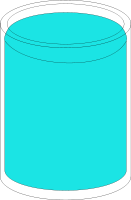Floating and sinking/Lesson Document: Difference between revisions
JanetBlair (talk | contribs) No edit summary |
No edit summary |
||
| (2 intermediate revisions by the same user not shown) | |||
| Line 1: | Line 1: | ||
[[Image:Glass of water1.png]] | |||
This constitutes a brief explanation of activities based around both materials that float and sink and also mass in air and mass when countered by up-thrust. | |||
Test some objects to see if they float or sink. Use a force-meter to measure their weight in air and their weight in water – the floaters should weigh nothing in water. Record the results in a spreadsheet table – do not graph the weights. | |||
This | This activity can easily be adapted for foundation stage children in that they can find different objects and can test whether they float or sink themselves. More able children might then talk about the materials that each object is made from and draw some conclusions. This is an opportunity for some basic recording using a simple table. | ||
For KS1 children exploring the relationship between the weight (mass) of an object and its volume is a key concept and the outlined activities would allow that as they stand. | |||
For KS2 children an investigation in to the way in which up-thrust works on objects in water can be easily extrapolated from this activity. Given the same weight/mass of plasticine can the children design a shape of object that either floats for he longest or sinks the fastest. As with the parachute drop, the issue here is one of successfully timing how long it takes for some shapes to sink – it can be less than a second if the water tank is not deep enough. | |||
'''Some other things to think about:''' | '''Some other things to think about:''' | ||
| Line 24: | Line 24: | ||
* What curriculum guidelines does this resource address? | * What curriculum guidelines does this resource address? | ||
For an extended enquiry on floating and sinking for 5-7 year | For an extended enquiry on floating and sinking for 5-7 year old children, download the following 8 page document: | ||
[http://fibonacci.uni-bayreuth.de/index.php?eID=tx_nawsecuredl&u=0&file=uploads/media/module10_01.pdf&t=1348157923&hash=7945f0762df3c1d2f945e8bfb6a41e16] | [http://fibonacci.uni-bayreuth.de/index.php?eID=tx_nawsecuredl&u=0&file=uploads/media/module10_01.pdf&t=1348157923&hash=7945f0762df3c1d2f945e8bfb6a41e16] | ||
Latest revision as of 16:41, 5 November 2012
This constitutes a brief explanation of activities based around both materials that float and sink and also mass in air and mass when countered by up-thrust.
Test some objects to see if they float or sink. Use a force-meter to measure their weight in air and their weight in water – the floaters should weigh nothing in water. Record the results in a spreadsheet table – do not graph the weights.
This activity can easily be adapted for foundation stage children in that they can find different objects and can test whether they float or sink themselves. More able children might then talk about the materials that each object is made from and draw some conclusions. This is an opportunity for some basic recording using a simple table.
For KS1 children exploring the relationship between the weight (mass) of an object and its volume is a key concept and the outlined activities would allow that as they stand.
For KS2 children an investigation in to the way in which up-thrust works on objects in water can be easily extrapolated from this activity. Given the same weight/mass of plasticine can the children design a shape of object that either floats for he longest or sinks the fastest. As with the parachute drop, the issue here is one of successfully timing how long it takes for some shapes to sink – it can be less than a second if the water tank is not deep enough.
Some other things to think about:
In this activity you are going to design and carry out an investigation into materials which will float and sink.
Choose a suitable story context which will give the activity purpose:
- What would the title for your investigation be?
- What would you encourage children to look for?
- How would they make their test fair?
- How would they record their findings?
- How would you support less able children?
- What curriculum guidelines does this resource address?
For an extended enquiry on floating and sinking for 5-7 year old children, download the following 8 page document: [1]

